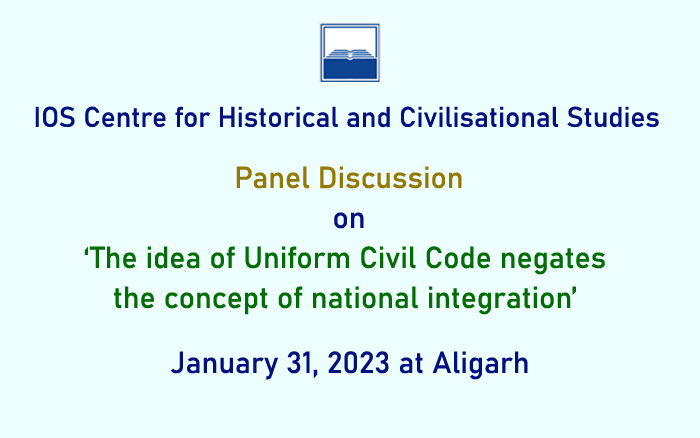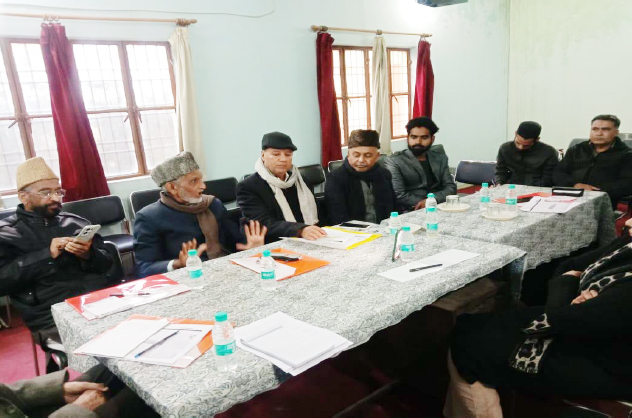IOSCHCS organises panel discussion on ‘The idea of Uniform Civil Code negates the concept of national integration”

IOSCHCS organises panel discussion on ‘The idea of Uniform Civil Code negates the concept of national integration”
New Delhi: A panel discussion on ‘The idea of Uniform Civil Code negates the concept of national integration’ was organised by the IOS Centre for Historical and Civilisational Studies at Aligarh on January 31, 2023 to pay homage to Mahatma Gandhi on his martyrdom.
The function commenced with the recitation of a verse from Qur’an. Former principal of Jamia College of Education, Aligarh, Dr. Zabeen Anjum welcomed the guests and briefly explained the purpose of the panel discussion.
Introducing the theme, the director of the IOSCHCS, Prof. Syed Jamaluddin said that the Centre focused mainly on Muslim contribution to Indian culture. He made a few points to understand the theme of the panel discussion. He said that the Muslims had been insisting on the recognition of their personal law as the basis for disposal of cases in various courts during the British period. It was perhaps in 1937 that a separate code was framed for the Muslims which was amended later on in 1939 by the British government, he noted.

Islamic scholar, Naushad Alam Chishti, who initiated the discussion, spoke on the significance of Muslim personal law in the context of the debate on Uniform Civil Code (UCC). He held that Muslim personal law was aimed at national integration. He said that Muslims came to India from different regions and settled here, made adjustments with indigenous people. Hindu customs, rituals and traditions continued to be practiced as before under the Muslim rulers. When the Britishers settled down in India, several changes took place. He maintained that the Britishers conducted a survey on the Shariah laws and later, Muslim women were denied the right to inheritance as per the Hindu Act. At that time, Shariah Act passed in 1937, was considered as the first step to establish Muslim cultural identity. This was the first triumph and was the reason for the formation of Muslim personal law. He said that post-Independence when the Constitution of India came into being in 1950 and the democratic system was established, the Constitution assured the preservation of the Muslim personal law and the personal laws of other minorities through the clauses 6, 25 and 29. Clause 6 stipulated that the government would make a law which would be common to all. this triggered unrest among Indian Muslims since the common law would mean interference in religious freedom enshrined in the Constitution, he said.
Chishti held that in recent times, interference began in the Shariah law concerning marriage, divorce and inheritance which led Muslims to increased worry about their personal law and they started suspecting the credibility of the government. A section of educated Muslims wanted that the civil matters to remain under the Shariah laws, but the criminal law should remain outside Shariah. He observed that when it came to personal law, only Muslims spoke on it while the need of the day was that they should join hands with other minorities as well since every minority community had its own personal law.
Prof. Syed Jamaluddin presented an overview of the shortcomings in the Muslim personal law which began to be noticed by Muslim intellectuals in the wake of Shah Bano case in 1985. He pointed out that while Muslims insisted on certain parts of the Muslim personal law, some other parts which especially hurt women were not being addressed. He said that while almost the entire world was opposing capital punishment, dubious silence was being maintained by the Muslims. He also dwelt on the constitution of the National Integration Council and the goals set for it. He observed that apparently, the idea of the uniform civil code was contrary to the concept of national integration. He gave a brief account of how the NIC came into being under the over-all patronage and guidance of the first Prime Minister, Pandit Jawaharlal Nehru who convened the first national integration conference in 1961 to combat divisive forces. The goal of the NIC was to awaken the people about unity despite caste, religion, region, language and community diversity, he added.
Prof. Jamaluddin insisted that the main objective of the setting up of the NIC was to review national integration issues and make recommendations to redress them. Politicians and eminent public figures were nominated to the NIC. The prime minister was made the ex-officio chairman of the council. The first meeting of the NIC was held in 1962 and the last one was convened in 2013. No meeting of the council took place thereafter. He held that the reason for not holding the meeting was that the concept of NIC did not find favour with the dominant political ideology today. He also said that in 1967, the then prime minister, Indira Gandhi brought in important additions in the objectives of the Council which were inspired by the Preamble to the Indian Constitution. These included common citizenship, unity in diversity, freedom of religion, secularism, equality, social, economic and political justice. He concluded by saying that efforts should be made to revive the NIC which was in the interest of the nation.
Former principal, STS School, Aligarh Muslim University and Indian School, Riyadh, Manzar Imam observed that the Muslims should use both legal and political options on the issue of UCC. He said that when the Constitution was being drafted, two theories emerged with regard to Article 44. He quoted the provisions of Article 44, which says, “The state shall endeavor to secure a Uniform Civil Code for the citizens throughout the territory of India”. In the Constituent Assembly, Naziruddin Ahmad, a member from West Bengal, had stressed the importance of obtaining the consent of communities whose religious laws would be affected by the new code, i.e., Article 44. He said that as against Naziruddin’s opinion, K.M. Munshi had expressed the view that Article 44 had no concern with religion, adding that the government had the right to make a law which would aim at social reform and lead in furthering secular activity. He referred to Dr. B.R. Ambedkar’s opinion that the common civil code was a temporary provision and all possibilities would be explored to implement it.
After the question-answer session, Prof. Syed Kalim Zaidi from the faculty of Engineering, AMU Advocate Farhatullah Usmani, retired banker an owner of City Hospital, Aligarh, M.R. Khan, Dr. Qamrul Islam and Liyaqat Ali, stressed the need for creating awareness about the false propaganda regarding UCC which was feared to adversely impact national unity.
In his presidential remarks, former chairman, department of geography, AMU, Prof. Salahuddin Qureshi congratulated the speakers for their reflections on the theme. He said that the problem of UCC should not be confined to Muslim community alone. One must realize that other minorities also held the view that the UCC was not in their interest. He opined that UCC was against the tenets of socio-cultural diversity of India. He added that India had a historical heritage of diversity of thousands of years and this could not be obliterated by any particular law. It would be counter-productive to bring UCC which was not in the interest of national unity. He pleaded for abolishing capital punishment. However, he was critical of those powers who considered death penalty as barbaric. He blamed the Muslim community for failing to address crucial issues related to marriage and divorce. The community itself afforded opportunities to others to make slanderous remarks against Muslims. Referring to women empowerment, he said that women themselves were against women, particularly in the Muslim community. He was critical of the practice of asking wife to give up Mahar (alimony) which meant depriving them of their right. He pointed out that there was a big difference between what Islam said and what the Muslims practiced. He called upon the Muslims to look inward and then react.
At the end of the discussion, Prof. Syed Jamaluddin remarked that UCC was a political issue and should be tackled keeping in view the fact that India was a pluralistic society. He held the view that there was no way out for the survival except pluralism and pluralistic culture. He informed that the next theme of the discussion would focus on pluralism. He extended a vote of thanks to the speakers and the attendees. Those who attended the seminar included members of the academia, social activists, researchers and prominent citizens.
Go Back